Sir Richard Branson’s Virgin Galactic spaceflight will today fly the first ever paying customers to the edge of space.
Taking off from New Mexico, Galactic 02 will take three passengers – an 80-year-old former Olympian with Parkinson’s disease and a mother and daughter duo who won their tickets in a sweepstake – 50 miles (80km) above Earth.
On board the VSS Unity, which boasts more windows than any other spacecraft in history to “optimise zero-G viewing”, they will experience around five minutes of weightlessness before returning to their loved ones staying at Galactic’s all-inclusive luxury desert accommodation.
For octogenarian Jon Goodwin, from Newcastle, it will have been an 18-year wait since he signed up – at a total cost of ($450,000) £356,000.
He, Keisha Schahaff, 46, and her 18-year-old daughter Anastatia Mayers, will join the likes of Branson and Amazon founder Jeff Bezos in the group of just 700 people who have ever left the Earth’s atmosphere.
But after the death of five men on a submersible destined for the wreckage of the Titanic weeks before, many have questioned why we’re drawn to such extreme environments – and how extreme wealth impacts the decision to take the risk.
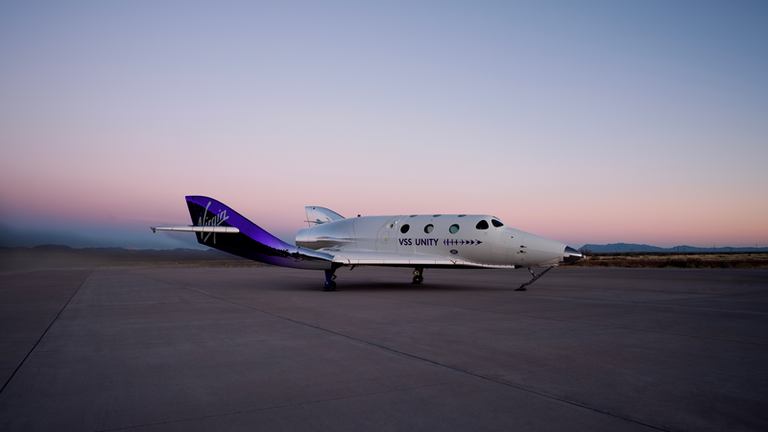
VSS Unity spaceplane. Pic: Virgin Galactic
The overview effect, flow state and self-esteem
The so-called ‘overview effect‘ – a cognitive shift reported by astronauts when they go into space – has been well documented since the days of the final frontier.
Branson, who eventually hopes to operate 600 tourist spaceflights a year, includes it in Galactic’s marketing, defining it as a “shift in awareness and perspective brought about by viewing the Earth from space”.
Flow state – being completely focused on a single thing – is another key experience people crave from extreme environments, says Professor Emma Barrett, an expert in the psychology of performance and wellbeing in extreme environments at the University of Manchester.
“You’re in a tight margin between safety and mortal danger,” she tells Sky News.
“There’s something about being in a place where you have to focus on what’s immediately in front of you, because the risks are so immediate.”
That level of focus can be addictive, she says, as it creates a “detachment from everyday life”.
“It’s a very rewarding place to be because any chaos, unpleasantness or stress at home melts into nothing.”

Virgin Galactic’s rocket at the edge of space in 2021
Read more:
Branson, Bezos, Musk: What you need to know about the billionaire space race
Virgin Galactic – what happens and how much are tickets?
Analysis: For Branson – this is more than just a publicity stunt
This is something the super-wealthy may find particularly appealing – away from the high-powered decision-making of big businesses.
Jessica Love, a PhD candidate in sports psychology at the University of Portsmouth and paraglider pilot, points to other psychological benefits of being in extreme environments highlighted in recent research.
These include an increase in self-esteem, sense of identity and emotional diversity, as well as a connection to the natural environment.
Examples of activities that can achieve these range from heli-skiing and mountain climbing to base jumping.
Extreme tourists are ‘control freaks – not thrill seekers’
Historically, people interested in adventure tourism have been associated with “deviant personality characteristics”, Ms Love says. But she adds: “No one I’ve ever met in this field has any desire to die.”
And according to Professor Barrett the stereotype of “adrenaline junkies” isn’t backed up by research.
“The environments I look at are where people aren’t really evolved to exist. They’re inherently risky. Climbers have told me, for example: ‘We’re not thrill seekers, we’re control freaks’. They seek to control as much as they can to reduce those risks right down.”
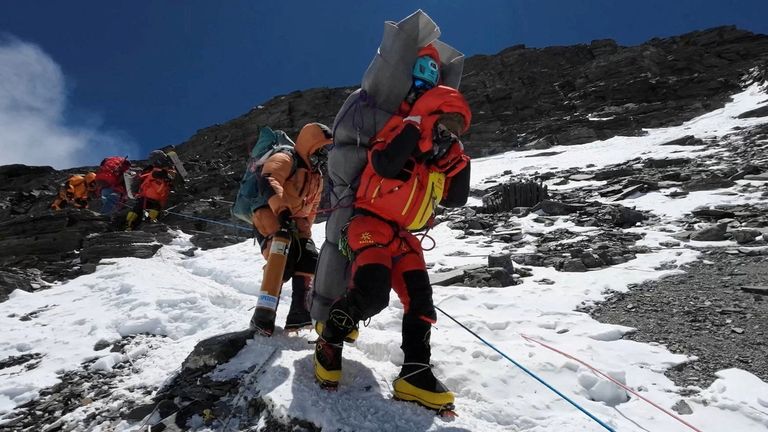
A sherpa rescues a climber from Mount Everest’s ‘death zone’ in May. File pic: Reuters
This level of risk perception can vary according to gender, says Dr Adele Doran, principal lecturer in tourism management at Sheffield Hallam University.
Dr Doran, who looks specifically at diversity within adventure tourism, says men tend to have “larger comfort zones” and “more flex with their perceptions of risk”.
“Men are focused on the risk – and that sense of achievement afterwards,” she tells Sky News. “Whereas women are more focused on the journey – what they can learn about themselves and others, the relationships they form, and the skills they develop.”
This content is provided by Spreaker, which may be using cookies and other technologies.
To show you this content, we need your permission to use cookies.
You can use the buttons below to amend your preferences to enable Spreaker cookies or to allow those cookies just once.
You can change your settings at any time via the Privacy Options.
Unfortunately we have been unable to verify if you have consented to Spreaker cookies.
To view this content you can use the button below to allow Spreaker cookies for this session only.
Follow the Daily podcast on Apple Podcasts, Google Podcasts, Spotify, Spreaker
As well as its pre-flight readiness programme of medical, psychological checks and training, Virgin Galactic offers ticketholders “lifetime access to our global community of pioneers”, which it says are “bound by a passion for adventure and positive change”.
They also have the chance to bring three guests with them to “share in the love, awe and wonder” of the spaceflight.
This language around legacy and sharing a unique experience few on Earth have had plays into those classic motivations, according to the experts.
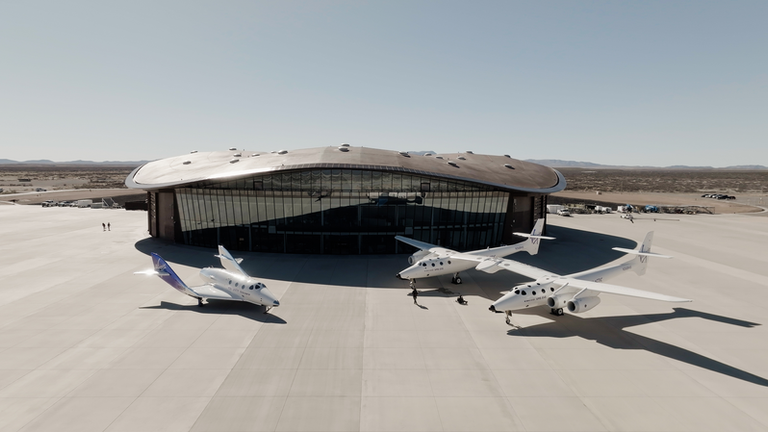
Spaceport America, New Mexico. Pic: Virgin Galactic
Infinite resources can lead to ‘dulling of risk perception’
Although Virgin Galactic tickets are several hundred thousand pounds, they’re little compared to the billions the likes of Branson, Bezos and Elon Musk have invested in the space market.
While Musk is rumoured to have secured one of the later trips on Galactic, he is the only one of the billionaire space race candidates not to have entered orbit himself.
Sources close to him say he doesn’t see the appeal of lower-level spaceflights, when his real goal is to send people to Mars on SpaceX by 2025.
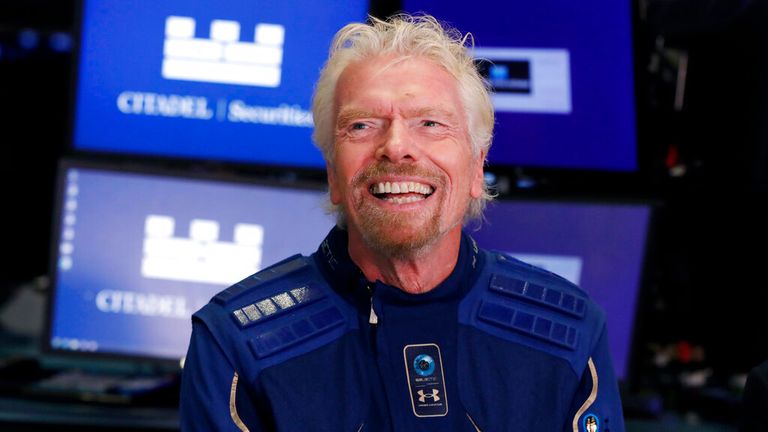
Sir Richard Branson. Pic: AP
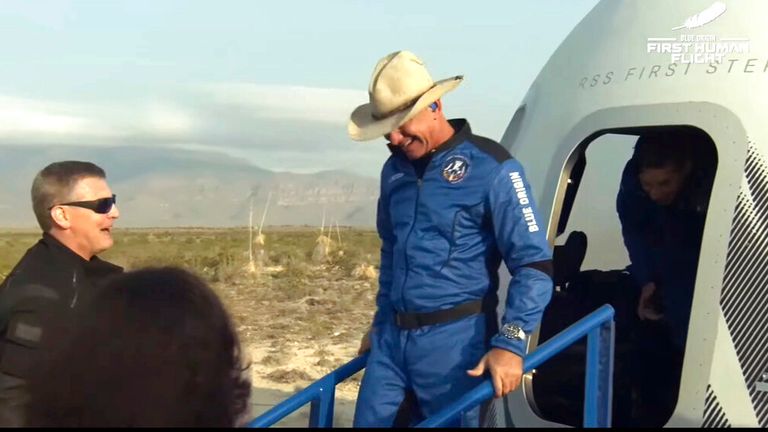
Jeff Bezos disembarks his Blue Origin space capsule. Pic: AP/Blue Origin
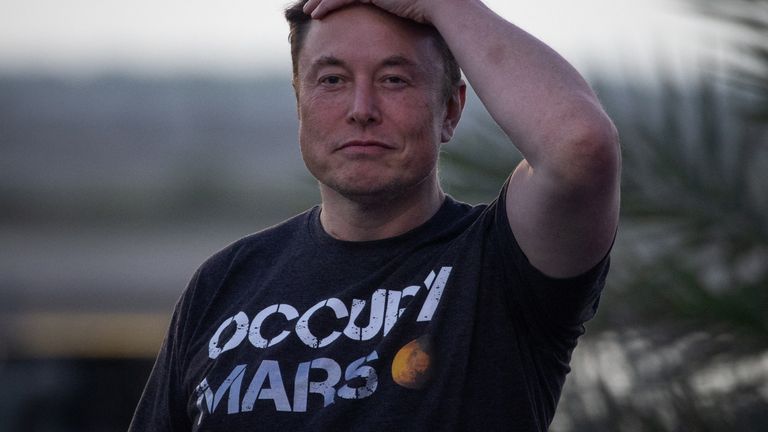
Elon Musk at the SpaceX starbase in Texas last year
Lee Chambers is an business psychologist who works primary with senior leaders and has looked specifically at how extreme wealth and privilege affect health behaviours.
He says that infinite resources often mean the super rich have less concern for the financial consequences if things go wrong, which lead to an “erosion of perspective” and “dulled risk perception”.
“So much of their life is facilitated by others around them and the structures they create. They still look to mitigate risks, but they’re passed onto someone else who’s paid to control every variable for them,” he tells Sky News.
This “sense of entitlement” can lead to a psychological adaptation that sees the extreme become normal by constantly viewing situations through a “wider strategic lens” where the mundane details are disregarded, he says.
“That entitlement buffers against risk and you begin looking for something above normal – something not normal even at that ‘rich list’ level”, he says – like going to Mars, for example.
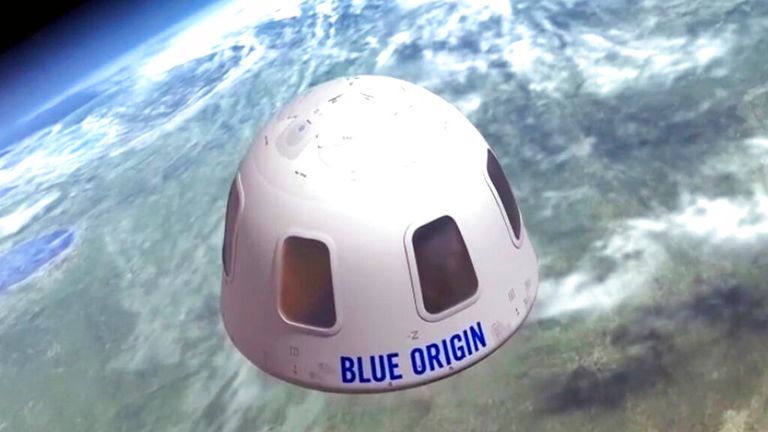
An artist’s illustration of the Blue Origin capsule. Pic: AP
This can often be exacerbated by wealthy people’s tendency to surround themselves with others of a similar status, he adds.
And in the context of the billionaire space race, Dr Doran says that these off-the-beaten-track, extreme travel pursuits “tend to be dominated by white, heterosexual, able-bodied men”.
This can result in “hyper-masculine behaviours”, which Mr Chambers says are often part of a feedback loop, whereby risk-taking is championed because high-risk business decisions have got them to where they are now.
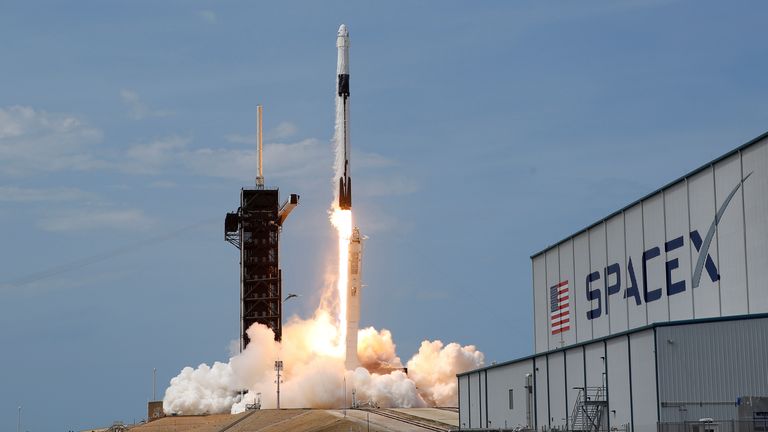
SpaceX launch in 2020. File Photo
Test flight pilot death heightens safety protocols
Branson’s team has spent 17 years designing, building and safety checking VSS Unity and its first three private space tourists began their training programme a year ago with High-G and Zero-G preparation courses.
Since a test flight of the original SpaceShipTwo crashed over California’s Mojave Desert in October 2014, killing one of the pilots, they have introduced several new safety measures.
These include an improved spacecraft design for VSS Unity, safety management systems that detect and avoid space debris, and emergency evacuation protocols for pilots and passengers.
They also complied fully with the US Federal Aviation Administration (FAA) when a probe into another test flight in October 2021 found the “strength of margins” of materials used for the rocket plane had caused it to veer off course on its descent to the runway.
According to Virgin, VSS Unity now has an advanced flight control system capable of automatically controlling its ascent and descent and its team of pilots have 236 years of collective flight experience, including with NASA, the RAF and US Marine Corps.
With all this in place, it now has all the relevant permissions and prides itself on being the first vehicle of its kind to receive a full licence to fly customers to space from the FAA.
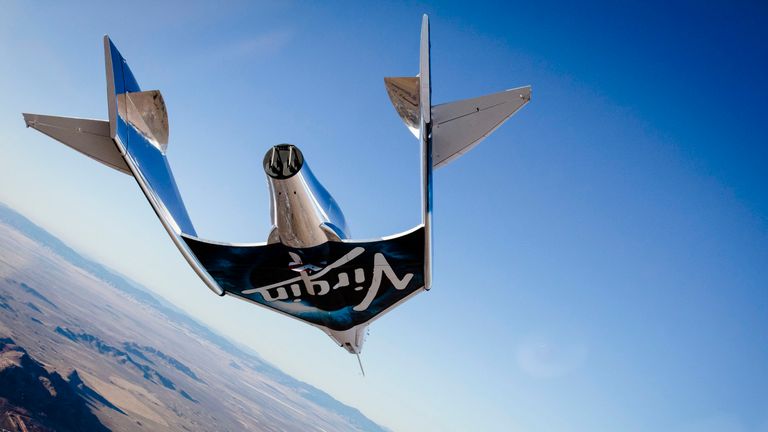
Virgin Galactic’s original SpaceShipTwo over the Mojave Desert in 2016
Competing to go the furthest can ‘become quite dangerous’
OceanGate, the company that operated the ill-fated Titanic submersible has suspended all commercial operations, with widespread concerns safety was not an important enough priority.
Karl Stanley, a friend of the OceanGate chief executive Stockton Rush, who was one of the five who died on board, said in one interview he had created a “mousetrap for billionaires”.

Titan submersible in June 2021. File pic: OceanGate Expeditions via AP
OceanGate co-founder Guillermo Söhnlein has since said he wants to send 1,000 humans to Venus, the warmest planet in the solar system where atmospheric pressure is 90 times stronger than on Earth, by 2050.
Mr Chambers says that although it is too soon to know what happened with the submersible, with criminal investigations pending, extreme wealth and the ego that goes with it can “leave you blind” to potential risks when competing to go the furthest.
“When it comes to a single individual who believes they’ve created something unique – and they are the sole conveyor of that experience, that’s when it can become quite dangerous,” he adds.
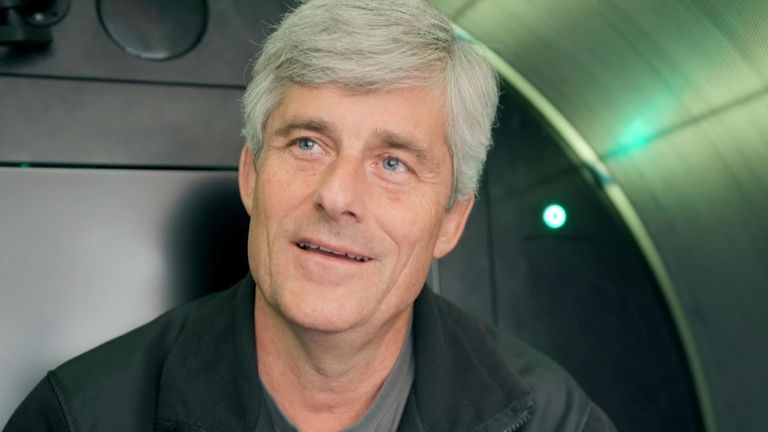
Oceangate chief executive Stockton Rush who died on board the Titan submersible

British billionaire Hamish Harding who also died on board. Pic: Jannicke Mikkelsen/Reuters
When people climb a mountain – whether it be Everest or Ben Nevis – hikers always agree a turnaround time at which point they will come back to avoid poor conditions or over-exhaustion.
But Professor Barrett says that with the level of money involved in this type of extreme tourism, the pressure to deliver for customers could see that ignored.
“Some people do push themselves over the limit and die that way,” she says.
“And if you’ve got paying clients who are really excited to see the Titanic, maybe that’s harder to resist. That idea that I’ve invested so much and come so far and I’m nearly there. Sometimes that’s what pushes people over that threshold.”







